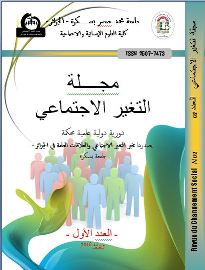النظرية الوظيفية الجديدة وتحليل البناء الاجتماعي
Résumé
تحاول هذه الدراسة مناقشة وتحليل مختلف أفكار الوظيفية الجديدة، حول كيفية عمل المجتمعات، ولماذا توجد المؤسسات والأعراف؟ وفهم اكمل حول عمل النسق ، خاصة وسط متغيرات الواقع المعقد، من القرارات المتناقضة والتفاعلات والأسباب والنتائج من الكثرة؛ بحيث ستحصل عواقب غير متوقعة لأفعالنا. مما يقتضي تحليل هذا الواقع وفق رؤية متعددة الابعاد، تستند الى التكامل بين مستويات التحليل بعيد المدي ومستويات قصير المدى، كما تطرحه الوظيفية الجديدة. محاولة لفهم المجتمع في شموليته واتساق واقعه، بجميع محدداته البنائية التي توجه الفاعل في موقف الفعل، وكذا بالحالة التي تظهرها الطبيعة النشطة للإنسان، في محاولته تغيير ظروفه أو تعديلها مع امتداد الزمان والمكان. وسيكون ذلك بتحليل متقن مشروط بإبراز خصائص معرفية معينة للنظرية الوظيفية الجديدة، لتحليل جوانب إبريقية كما يطرحها "جفري الكسندر"، و"نيل سملسر"، و .. كأهم منظري الوظيفية الجديدة
This study discusses and tries to analyse the different ideas of " Neofunctionalism" ;how the societies work and why there are many institutes and customs and it tries to giving a clear idea about how they work specialy among the complicated reality's changes and the contradicted decisions, interactions, causes and the results because it could be many unexpected results of our actions
that's why we need to analyse this reality from vision based on integral between the diffrent analyse's levels as " Neofunctionalism "does , in a way to understand the society with its reality ,its building elements and the active nature of human who tries to change his curcumstances and make them better throught time and space.
We try to do that throught an analysis based on showing specific knowlegable characteristics of " Neofunctionalism " theory to analyse practical sides as jeffrey C. and Smelser.. , do



